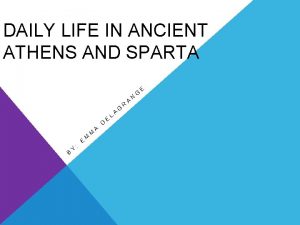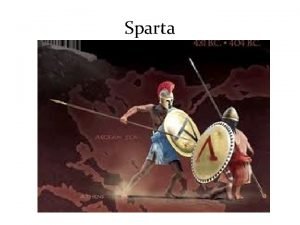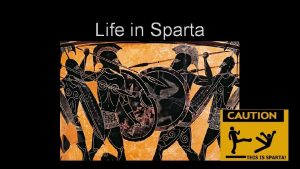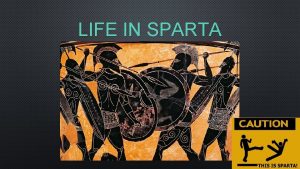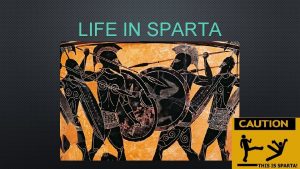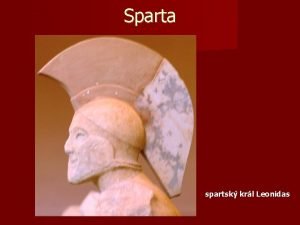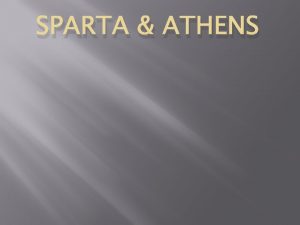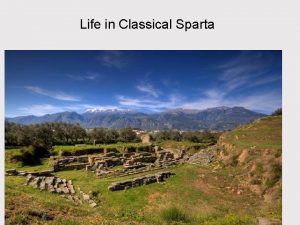Sparta Sparta Living in Sparta Life was harsh












- Slides: 12

Sparta

Sparta Living in Sparta • Life was harsh and cruel • One basic rule of law: Put Sparta’s needs above your own • Sparta had a huge, powerful army • Spartan citizens only trained for war • Helots farmed the land • Helots greatly outnumbered Spartan citizens

Sparta

Sparta Growing Up in Sparta • • • If a baby was born and it looked unhealthy, it was left to die. Boys began military training at 7 Boys were encouraged to cheat and steal, but were punished if caught At 20, boys became soldiers At 30, they could join the Assembly At 60, they could retire from the army Girls had more freedom and opportunities than any other girls in Greece Girls exercised and trained to have strong bodies to have healthy babies Women ran farms and estates Spartans only interest was to be strong, brave and powerful in battle. Spartan women told their men, “Come home with your shield, or come home on it. ”

Athens and Sparta The Persian Invade • Persian Empire was extending its control through the middle east around 500 BC • They attacked Greek City-States in Ionia (Asia Minor) • They Ionian Greeks asked the mainland Greeks for help • The help didn’t work and the Ionians were conquered by the Persians • Persians then invaded Greece with a huge army • King Darius wanted to punish Athens for helping the Ionians revolt against the Persians • They intended to conquer all city-states • Athens and Sparta and other city-states joined together to defend their land • The Athenian army of Hoplite soldiers defeated the Persians at the Battle of Marathon in 490 BCE even though they were outnumbered 20, 000 vs. 10, 000 • The Persians left Greece defeated

Athens and Sparta

Athens and Sparta

The phalanx formation was a block of soldiers of many rows wide and deep carrying 21 foot spears.

The Athenian Hoplite The Hoplite was a citizen soldier who paid for his own armor and weapons

Athens and Sparta The Persian Wars • In 480 BCE the Persians invaded again led by Darius’ son King Xerxes • Athens, Sparta, and many other city-states united to fight the Persians • Famous battle of The 300: 300 Spartans fought 5, 000 Persians at the pass at Thermopylae. They held them for 2 days before all being killed • Athens built triremes, huge ships, to fight the Persians • At the battle of Salamis, the Persian navy was destroyed • Xerxes left Greece in defeat in 479 BCE never to return

Athens and Sparta

Athens and Sparta Conflict and the Athenian Army • After the Persian War, City-states formed the Delian League to protect themselves from invaders. Sparta did not join • Athens became the most powerful city-state. They controlled the sea, trade, and silver mining • Athens prospered from the alliance, due to tributes paid to them, but other city-states did not Sparta and Athens at War • Athens used the Delian League to become rich and powerful • Sparta and other city-states formed the Peloponnesian League to protect themselves from Athens • In 431 BC, the Peloponnesian War began ( Athens vs. Sparta ) • Athens had powerful navy, Sparta had a powerful army • Sparta could not be attacked by sea. • Sparta invaded Athens. The war lasted 27 years • Plague killed 1/3 of Athens population • Sparta won the war and Athens never recovered • But, the war weakened Sparta too, and they were eventually conquered as well
 What was the manor economy based on
What was the manor economy based on Harsh moolani
Harsh moolani Chapter 21 harsh and arid lands
Chapter 21 harsh and arid lands Taj mahal poem simile
Taj mahal poem simile Harsh gupta md
Harsh gupta md Harsh manchanda
Harsh manchanda Harsh golwala
Harsh golwala Harsh kalra
Harsh kalra Living and nonliving things venn diagram
Living and nonliving things venn diagram Is mold living or nonliving
Is mold living or nonliving Living non living dead
Living non living dead This organelle often ships proteins to the golgi apparatus
This organelle often ships proteins to the golgi apparatus Daily life in ancient athens
Daily life in ancient athens












